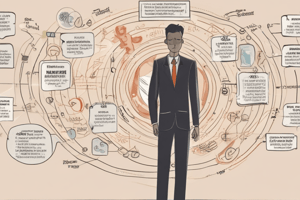Podcast
Questions and Answers
What is the primary focus of planning in management?
What is the primary focus of planning in management?
- Implementing organizational structure
- Motivating and leading employees
- Setting objectives and determining a course of action (correct)
- Monitoring and evaluating progress towards goals
Which management function involves arranging resources to implement plans?
Which management function involves arranging resources to implement plans?
- Organizing (correct)
- Controlling
- Strategic Management
- Leading
What does controlling in management primarily entail?
What does controlling in management primarily entail?
- Forecasting future conditions
- Allocating resources effectively
- Setting performance standards (correct)
- Influencing employee behavior
Which type of management is primarily concerned with day-to-day operations?
Which type of management is primarily concerned with day-to-day operations?
What is the key emphasis of behavioral management theory?
What is the key emphasis of behavioral management theory?
Which skill is essential for understanding complex situations in management?
Which skill is essential for understanding complex situations in management?
What is a common challenge faced in management?
What is a common challenge faced in management?
Which management theory suggests that strategies should vary according to the situation?
Which management theory suggests that strategies should vary according to the situation?
Flashcards are hidden until you start studying
Study Notes
Definition of Management
- Process of planning, organizing, leading, and controlling resources.
- Aims to achieve organizational goals efficiently and effectively.
Key Functions of Management
-
Planning
- Setting objectives and determining a course of action.
- Involves forecasting future conditions and allocating resources.
-
Organizing
- Arranging resources and tasks to implement plans.
- Establishes the organizational structure and defines roles.
-
Leading
- Influencing and directing people to work towards organizational goals.
- Involves motivation, communication, and conflict resolution.
-
Controlling
- Monitoring and evaluating progress towards goals.
- Involves setting performance standards, measuring actual performance, and taking corrective action.
Types of Management
- Strategic Management: Long-term planning and direction.
- Operational Management: Day-to-day operations focus.
- Financial Management: Managing finances and investments.
- Human Resource Management: Managing workforce and employee relations.
Management Theories
-
Classical Management Theory
- Focus on efficiency and productivity (e.g., Taylor's Scientific Management).
-
Behavioral Management Theory
- Emphasizes human behavior and motivation (e.g., Maslow's Hierarchy of Needs).
-
Contingency Management Theory
- Suggests that management strategies should vary according to the situation.
-
Systems Theory
- Views the organization as a system of interrelated parts.
Skills Required for Effective Management
- Technical Skills: Knowledge of specific tasks or processes.
- Interpersonal Skills: Ability to communicate and motivate others.
- Conceptual Skills: Understanding complex situations and strategic thinking.
Importance of Management
- Ensures organizational efficiency and effectiveness.
- Facilitates goal achievement and aligns resources.
- Encourages innovation and adaptability in a changing environment.
Challenges in Management
- Managing change and uncertainty.
- Balancing stakeholder interests.
- Navigating technological advancements and globalization.
- Promoting diversity and inclusion in the workplace.
Definition of Management
- Management is the process of planning, organizing, leading, and controlling resources.
- Aims to efficiently and effectively achieve organizational goals.
Key Functions of Management
- Planning: Involves setting objectives, forecasting future conditions, and deciding on actions while allocating resources.
- Organizing: Arranges resources and tasks to implement plans, establishing structure and defining roles within the organization.
- Leading: Focuses on influencing and directing personnel towards organizational objectives, emphasizing motivation, communication, and conflict resolution.
- Controlling: Monitors and evaluates progress towards goals, setting performance standards, measuring actual performance, and implementing corrective actions when necessary.
Types of Management
- Strategic Management: Focuses on long-term planning and direction for the organization.
- Operational Management: Concerned with day-to-day operations and maintaining efficiency.
- Financial Management: Involves managing finances, investments, and budgeting.
- Human Resource Management: Manages workforce dynamics, employee relations, and organizational culture.
Management Theories
- Classical Management Theory: Prioritizes efficiency and productivity, exemplified by Taylor's Scientific Management.
- Behavioral Management Theory: Highlights the importance of human behavior and motivation, like Maslow's Hierarchy of Needs.
- Contingency Management Theory: Argues that management approaches should adjust based on situational variables.
- Systems Theory: Considers organizations as systems with interrelated parts that function cohesively.
Skills Required for Effective Management
- Technical Skills: Involve knowledge of specific tasks or processes relevant to the organization.
- Interpersonal Skills: Essential for effective communication and motivation among team members.
- Conceptual Skills: Enable understanding of complex situations and the ability to think strategically.
Importance of Management
- Ensures that the organization operates efficiently and effectively to promote goal achievement.
- Aligns resources effectively, fostering innovation and adaptability to navigate changes in the environment.
Challenges in Management
- Managing change and uncertainty in dynamic market conditions.
- Balancing the interests of various stakeholders within the organization.
- Adjusting to technological advancements and the effects of globalization.
- Promoting diversity and inclusion to create a healthy workplace culture.
Studying That Suits You
Use AI to generate personalized quizzes and flashcards to suit your learning preferences.




